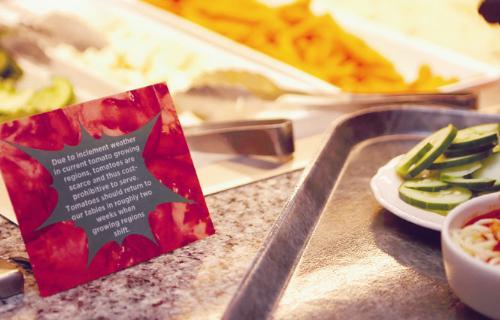
News
Summers Will Not Finish Semester of Teaching as Harvard Investigates Epstein Ties

News
Harvard College Students Report Favoring Divestment from Israel in HUA Survey

News
‘He Should Resign’: Harvard Undergrads Take Hard Line Against Summers Over Epstein Scandal

News
Harvard To Launch New Investigation Into Epstein’s Ties to Summers, Other University Affiliates

News
Harvard Students To Vote on Divestment From Israel in Inaugural HUA Election Survey
You Say Tomato—Or Not
Yes! We have no tomatoes.

Harvard students may be making do with scraggly salads in the face of a nationwide tomato famine, but diners at the University’s more posh eating establishments are still able to see red mixed in their greens.
A shortage of tomatoes throughout the country has forced Harvard University Dining Services (HUDS) to strike fresh tomatoes from its menus, according to Martin D. Breslin, executive chef for residential dining. But the Harvard Faculty Club (HFC) and HUDS-catered events have managed to hold strong to the red fruit.
“The tomato harvest has been the worst in recent history,” Breslin said. Hurricanes in Florida, torrential rains in Mexico, and flooding in California have led to a recent dearth.
The shortage has caused prices to skyrocket, tripling or quadrupling in some cases.
And those that are available are of such poor quality that they can’t be served.
“We don’t like to serve an inferior quality product in our dining halls,” Breslin said.
He questioned whether students would even be willing to eat tomatoes from the current harvest. He said the current crop is unripe and discolored, often with bruising on the exterior.
“Even if we did put what was available [in the dining halls], you’d look at it twice and go ‘ugh,’” he said.
Such a product isn’t worth the high prices it demands, he said. The normal price for a case of tomatoes is approximately $15, while current prices are close to $70.
HUDS has been able to substitute canned tomatoes into some of its recipes, he said.
Still, according to Undergraduate Council President Matthew W. Mahan ‘05, the shortage does not seem to have prevented HUDS’ Crimson Catering from serving tomatoes.
“I can confirm from experience that Crimson Catering has tomatoes,” Mahan said. He reports having seen tomatoes served at meetings catered by HUDS as recently as this week.
Like Crimson Catering, the HFC has also continued to serve tomatoes.
Michael A. Brentana, HFC’s executive chef, said that the increase in price has caused the Faculty Club to reduce the number of tomatoes it buys but not to stop serving the fruits altogether.
“We still have tomatoes. We still order them, but we don’t order as many,” Brentana said.
Whatever the reason, tomatoes are absent from salad bars in the dining halls—whether conspicuously or not.
“I honestly didn’t even notice that there weren’t any tomatoes,” said Theresa S. Chan ’06. She said that she does not normally include tomatoes in her salads and is indifferent to the shortage.
But others who normally eat tomatoes in the dining halls, like Alexandra M. Ohanian ‘05, say they understand HUDS’ decision not to serve the fruit when the harvest is poor.
“During their bad time, maybe it’s better for us not to see them,” she said.
Mahan suggested that funding ordinarily spent on tomatoes should be used to fund other food options.
“If they’re not buying any tomatoes, they must be saving some money,” Mahan noted. Otherwise, he said, tomatoes could be served on a more occasional basis, such as once every three days.
But, for tomato eaters like Ohanian, good news lies on the horizon.
Breslin said he’s gotten word from Florida—normally HUDS’ source of tomatoes at this point in the year—that quality will increase and prices will drop over the next two to three weeks.
“As soon as the quality improves,” he said, “we will have tomatoes back.”
Want to keep up with breaking news? Subscribe to our email newsletter.
